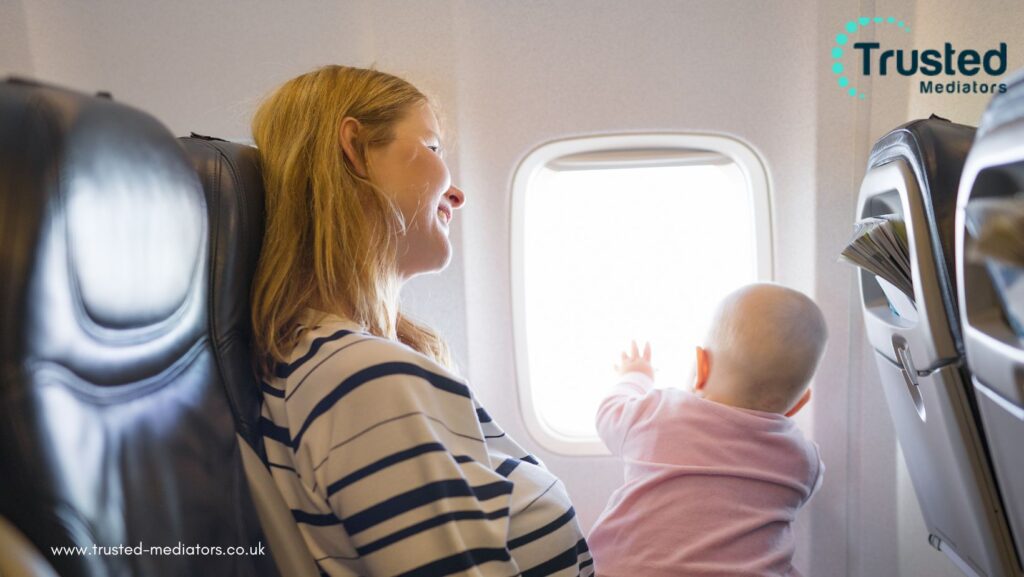Understanding travel restrictions in child arrangements. Travelling with children create issues when parents are separated or divorced. It’s important to understand legal requirements before you make any plans. Both parents have to know what to do to take kids out of the country. You must make sure you have the right documents for your children when you travel.
Understanding travel restrictions in child arrangements helps your children stay safe. It also makes sure their rights are taken care of. When you know about legal requirements and parental responsibility, you will not have as many fights. You also stop yourself from breaking the law. arrangements for safe and easy travel.

Travel Restrictions in Child Arrangements – Legal Rules for Travelling with Children in the UK
The Children Act is the law in the UK for child arrangements. This makes sure the needs of the child come first. Parents and guardians have to follow some rules. It is important when they want to travel to another country with a child.
Travel Restrictions in Child Arrangements – Parental Responsibility and How It Affects You
Parental responsibility is having the right to make choices for a child. They can decide things like what school the child goes to, what healthcare the child gets. Or if the child can travel to another country. A parent has these rights when their name is on the child’s birth certificate. Or if they have a parental responsibility agreement.
When people do not agree, it is good to understand parental responsibility. This makes sure travel plans or trips with family are clear to all. A birth certificate shares who has parental responsibility for a child. If parents are separated, you may need permission of the court with a legal order, so travel plans can be clear.
Travel Restrictions in Child Arrangements – Child Arrangements Orders and Travel Provisions
A child arrangements order advises where the child will live and who with. This also says what will happen if the child need to travel. A residence order lets a parent take the child to another country for a holiday. A child arrangements order can help make things clear for everyone.
If one parent does not agree with the travel plans, the court needs to agree. They will consider if the trip is good for the child. The child’s best interests will come first. When parents choose to live apart, it is important to discuss travel plans. This helps stop any problems before they start.
Travel Restrictions in Child Arrangements – Gaining Consent for International Travel
You need to get written consent from the other parent or the legal guardian to take a child out of the country. This rule help stops problems with the law. It also makes sure there are fewer worries about child abduction or taking the child without asking.
Family members should talk to each other to create the right paperwork. Parents can get written consent if they both agree. If not the court will decide.

Travel Restrictions in Child Arrangements – Who Needs to Provide Consent?
Consent for travel abroad depends on parental responsibility. If the parents do not live together, it can be hard to get the other parent to agree. If the parents keep having problems, then the court can get involved. The court will consider what is best for the child. People with parental responsibility must give their consent. If you have the right documents with you, travel arrangements are easier and less stressful.
Travel Restrictions in Child Arrangements – How to Obtain Written Permission from the Other Parent
Getting written consent starts when everyone agrees on who takes care of the child. You may need to show documents that prove you can speak for the child when you ask for written consent.
Use clear communication when you talk to the other person about the trip. Tell them where you plan to go and for how long you will be there. Keep details to help at the passport control you can show them. Copies of legal papers to help things go smoother.
Travel Restrictions in Child Arrangements – When Consent Cannot Be Reached
Consent fights can be hard and sometimes you need help to settle things. Otherwise you may end up in family court. What is best for the child is the most important thing in the choices that are make for them.
Parents should talk with each other or use someone to help them agree before thinking about going to court. When you do need to go to court, it can help make sure all people do what the judge says. This helps keep things fair. It also helps fix problems and resolves disputes.
Travel Restrictions in Child Arrangements – Mediation and Dispute Resolution Options
Mediation help separated parents talk with each other in a safe way. The goal is to fix things yourselves instead of going to court. This work to sort out travel arrangements for their child. Mediation makes it easier for both parents to agree and work together. Speak to our team to find out more. Call 03300 101 306.
Independent mediators focus on looking after the child’s welfare. They listen to what each parent has to say. Mediation helps parents talk openly about plans. Parents discuss travel arrangements or other things that may come up later. Not just things that matter right now.
If parents can’t get along and fight. You can ask the court for help. A court order helps make it easy to plan travel problems. A court order helps make things easier for everyone.
Travel Restrictions in Child Arrangements – Applying to Court for Permission to Travel
When parents do not agree about taking their child abroad, you might need a specific issue order. This court order says what a parent can or cannot do when making plans for their family. It helps both parents know what their limits are if they do not agree.
At court hearings, the judges considers how the child is. They also look at what each parent does before they make a choice.
Getting everything set up can make things easier. It can also help you and your family fight less. You can arrange a callback with our team here.
Travel Restrictions in Child Arrangements – Preventing Unauthorised Removal of a Child
To stop someone from taking children without permission, you need to take a few steps. A prohibited steps order can help. This makes sure a parent cannot take a child to foreign countries. Unless they have all the correct papers and permission to go.
If a parent takes a child away without agreement, that causes issues. Lawyers keep things easy to understand and clear for everyone.
Travel Restrictions in Child Arrangements – Steps a Concerned Parent Can Take
Concerns about travel and child arrangements can be hard for parents. The safe return of a child is the most important thing. You might need to get a child arrangements order or a prohibited steps order from the family court
A mediator can help you put a parental responsibility agreement together. You should keep evidence of your relationship, and documents like the child’s birth certificate. This help make sure everyone follows the child arrangements and knows what the travel rules are for the child. This can then be taken to court to make legal
Travel Restrictions in Child Arrangements – Emergency Court Applications and Prohibited Steps Orders
In urgent situations, parents can ask the family court for help with child arrangements. If there is a risk of child abduction. Or you feel the other parent won’t respect their parental responsibility, the court can move fast. A family court may use a prohibited steps order. This order stops a child from leaving the country without consent.
It is important to act quickly. Provide evidence that your request is in the best interest of the child. This helps the court understand your side and support your application.

Travel Restrictions in Child Arrangements – Essential Documents and Practical Considerations
When you travel with your child, you need to know the rules. It is important to bring the right documents with you. A child’s birth certificate is useful. It helps prove the relationship with your child. You may be asked to provide it at passport control. There are other documents; a parental responsibility agreement or a change of name deed. You may also need written consent from the other parent. With these, it can be easier at a foreign border when you travel. If you and your child have a different surname this is crucial.
Sometimes, a country will ask for a visa as part of its entry requirements. It can be good idea to get legal advice from a family law solicitor. A family law solicitor can help you know if your travel plans meet all the rules you have to follow.
Travel Restrictions in Child Arrangements – What if my ex wants to stop me taking my child abroad without a valid reason?
Your ex is maybe trying to stop you from taking your child abroad without valid reason. They can only legally do so if there’s a court order in place. Or if they have parental responsibility.
If you both have parental responsibility, you must get their consent before taking the child out of the country. Even for a holiday.
If they refuse without good reason. You can apply to the family court for a Specific Issue Order. This decides whether the trip can go ahead. The court will look at the trip’s purpose and length. Also whether it’s in your child’s best interests. If your ex is unreasonably blocking the trip, the court is likely to approve it. Especially if it’s a short, well-planned holiday and not disruptive to the child’s routine.
Travel Restrictions In Child Arrangements – Conclusion
Dealing with travel restrictions in child arrangements means you have to be careful and know what the law says. You and the other parent must do what the Child Abduction Act tells you. You also need to follow all court orders about this. Doing these things can help you stay away from problems like child abduction. Always think about the child’s needs first.
Good communication is essential for separated parents. It makes things easier for everyone in the family. You should also keep all your papers and other important documents ready. When you know where to find these, you can stop problems from coming up when you travel with your child.
When separated parents work together, a trip can be a positive experience for a child. If everyone agrees on the plans and knows what is going on. It is easier for everyone. Speak to our team for further information and to find out how mediation can help. Call us on 03300 101 306.
